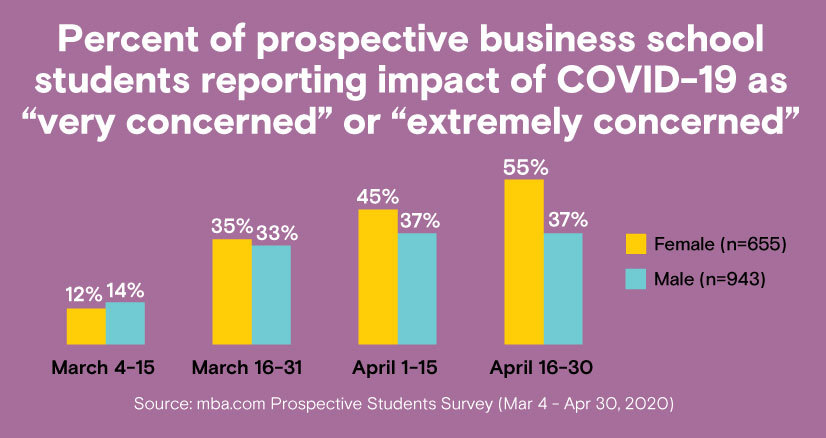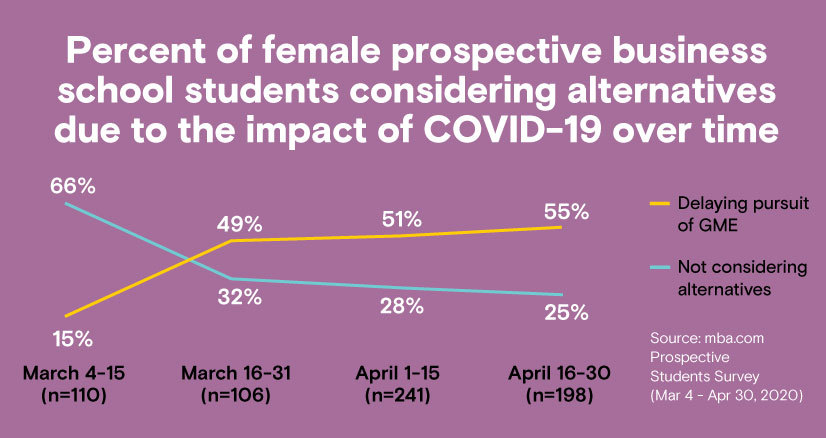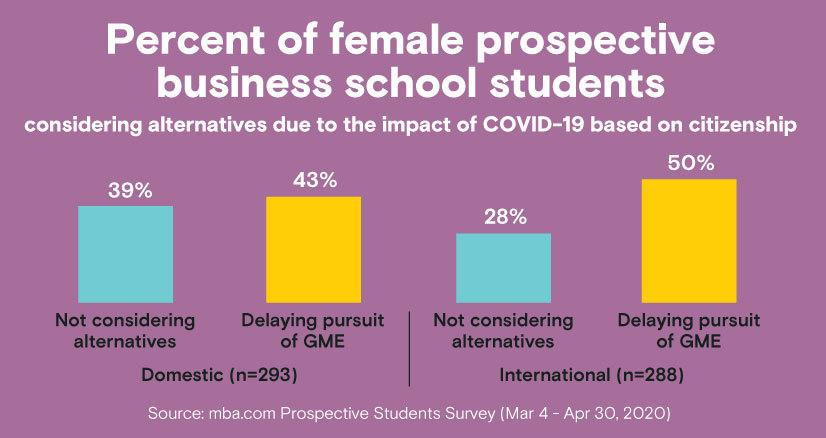As business schools adapt to the evolving impact of COVID-19, they remain focused on the diverse needs of their prospective students. The latest GMAC™ snapshot survey examines the shifting behavior of female candidates in response to the uncertainty posed by COVID-19. Findings suggest business schools need to double-down in engaging and communicating with female candidates to meet enrollment goals.

Over the last decade, the share of global GMAT™ exams taken by women has steadily climbed from 40 percent in testing year 2009 to 47 percent in 2019. Yet, gender parity in graduate business schools, especially in MBA programs, remains an unresolved issue. Prior GMAC research indicates that female candidates are more likely to report certain barriers in their pursuit of graduate management education as compared to their male counterparts. These barriers, including factors like admissions requirements, future debt burden, and confidence in their ability to be successful in the program may derail their journey to business school.
COVID-19 has added a new layer of complexity and uncertainty, which is creating barriers and resetting the decision-making journey for all GME candidates with varying levels of intensity. This blog looks at the nuances of gender and how women candidates are adapting to COVID-19.
Intensifying concerns
In this snapshot survey, overall, female candidates are more likely to report that they are very concerned or extremely concerned (41%, n=655) about the impact of COVID-19 on their pursuit of GME as compared to male candidates (32%, n=943). This higher degree of concern seems to intensify over time.
On March 15, the proportion of male and female candidates reporting that they were very concerned or extremely concerned was similar. However, the degree of concern for female candidates continued to climb over time while it stabilized for male candidates. By April 30, more than half of women respondents (55%) were very concerned or extremely concerned due to the impact of COVID-19. In contrast, the degree of concern for male candidates ranged from 33 percent to 37 percent for the next three periods ending March 31, April 15 and April 30.

Considering alternatives
As women’s level of concern about the impact of COVID-19 has intensified, the survey snapshot suggests that they’re more likely than male candidates to respond by delaying the pursuit of GME.
At the end of the March 15 survey period, two-thirds of female candidates reported that they were not considering any alternatives. In other words, they were staying on course with their plans. However, as the impact of COVID-19 has unfolded, there has been a consistent increase in the proportion of female candidates reporting an openness to consider alternatives. One of the most preferred alternatives seems to be delaying the pursuit of GME, with survey results showing an increase from 15 percent on March 15 to 55 percent by April 30.

International barriers
Data also suggests that international female candidates (28%, n=288) are less likely to report that they are not considering alternatives due to the impact of COVID-19 as compared to domestic female candidates (39%, n=293). In other words, international female candidates were more open to considering alternatives.
International female candidates (50%, n=288) were also more likely to report they are considering delaying the pursuit of GME as compared to domestic female candidates (43%, n=293).

Conclusions
The recent survey snapshot to gauge the impact of COVID-19 on female candidates suggests that the virus has increased the number of barriers for women as they attempt to navigate the uncertainty. As a result, the gap between male and female enrollment in GME may widen. To ensure that business schools’ focused efforts in recent years to achieve gender parity in GME are not lost, there is a need to understand the evolving journey of female candidates and pursue strategies that help maintain momentum. These strategies may include purposeful conversations, partnerships, and campaigns to strengthen and reinforce the pipeline of female candidates by showcasing alumni stories and communicating the value of GME.
Are you looking for more information on GMAC’s response to the coronavirus (COVID-19)? Find the most up-to-date information on the GMAT™ Online and the Executive Assessment Online exams, plus receive updates related on other assessments, test center closures, the GMAC Annual Conference, the MBA Tour, and more here.
Do you have any questions or suggestions related to this blog or other GMAC Research? Please click here to reach us.
| GMAC is collecting information about how business schools are responding to COVID-19 and sharing it with prospective candidates. |
About the Survey
This blog series is a part of the GMAC initiative to monitor and respond to the rapidly evolving impact of COVID-19 on graduate management education. The analysis reported in this blog is based on nearly 1,598 responses collected through the mba.com Prospective Students Survey between March 4 and April 30, 2020. In this analysis, international candidates are defined as candidates whose preferred study destination is not their country of citizenship. These findings are reflective of trends captured on mba.com and should be interpreted with caution in the rapidly evolving context of COVID-19.
